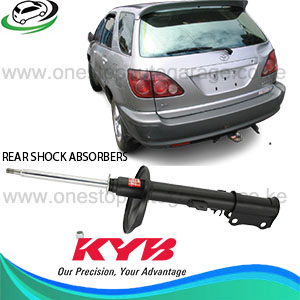Get Shock Absorber Subaru Impreza WRX Front 334300 KYB
A shock absorber, also known as a damper, is a critical component of a vehicle’s suspension system designed to absorb and dampen the impact and vibrations caused by uneven road surfaces. Here’s a detailed overview of the function and importance of shock absorbers:
Function of Shock Absorbers:
- Dampening Vibrations and Impact:
- The primary function of shock absorbers is to dampen and absorb the vibrations and impacts transmitted through the vehicle’s suspension system from the road surface.
- They convert the kinetic energy generated by bumps, potholes, and uneven terrain into heat energy, dissipating it effectively.
- Maintaining Tire Contact and Control:
- Shock absorbers help maintain consistent contact between the tires and the road surface, ensuring optimal traction and grip.
- This contributes to improved vehicle stability, control, and handling characteristics, especially during cornering and sudden maneuvers.
- Enhancing Ride Comfort:
- By smoothing out the ride and reducing oscillations, shock absorbers improve overall ride comfort for vehicle occupants.
- They minimize the jolts and bumps felt inside the cabin, providing a more pleasant and stable driving experience.
- Improving Braking Performance:
- Effective shock absorbers prevent excessive weight transfer and vehicle pitch during braking, allowing for more controlled and efficient braking performance.
- This contributes to shorter braking distances and enhanced safety in emergency braking situations.
- Extending Suspension Component Life:
- Shock absorbers play a crucial role in protecting other suspension components, such as springs, control arms, and chassis, from excessive wear and damage.
- By absorbing impacts and vibrations, they help prolong the lifespan of these components and reduce maintenance costs over time.
Importance of Shock Absorbers:
- Safety: Properly functioning shock absorbers are essential for maintaining vehicle stability and control, especially in adverse road conditions and during evasive maneuvers.
- Comfort: They significantly contribute to a smooth and comfortable ride by minimizing harsh impacts and vibrations.
- Performance: Shock absorbers play a pivotal role in optimizing vehicle dynamics, including handling, braking, and steering responsiveness.
- Longevity: Regular inspection and maintenance of shock absorbers are crucial for ensuring their effectiveness and longevity, as worn-out shock absorbers can compromise safety and ride quality.
Signs of Worn-Out Shock Absorbers:
1. Decreased Handling and Stability
- Increased Body Roll: Worn-out shock absorbers can cause excessive body roll or sway when navigating corners or uneven road surfaces. This leads to a feeling of instability and reduced control over the vehicle.
- Poor Steering Response: You may notice that the vehicle’s steering response feels vague or less precise, especially during sudden maneuvers or lane changes. This can be attributed to ineffective damping of the suspension system.
2. Rough or Uncomfortable Ride Quality
- Excessive Bouncing: One of the most noticeable signs of worn shock absorbers is a bouncing sensation after hitting bumps or dips in the road. The vehicle may continue to bounce several times instead of settling quickly.
- Harsh Impact: Instead of smoothly absorbing bumps, worn shock absorbers transmit more of the impact to the vehicle’s cabin, resulting in a rougher ride for occupants.
3. Noise from Suspension
- Clunking or Knocking Sounds: Worn-out shock absorbers can produce clunking, knocking, or banging noises from the suspension when driving over rough surfaces or irregularities.
- Noise Test: Perform a bounce test on each corner of the vehicle. Push down firmly on the bumper and release. Any unusual noises heard during this test can indicate issues with the shock absorbers.
4. Uneven Tire Wear
- Cupping or Patchy Wear: Worn shock absorbers can lead to uneven tire wear patterns, such as cupping or scalloping. This occurs when the tires repeatedly bounce on the road due to inadequate damping, causing irregular wear on the tread surface.
- Inspect Tires: Check the tread pattern of your tires for signs of uneven wear, particularly on the edges or in patches. Addressing worn shock absorbers can help prevent premature tire replacement.
5. Fluid Leaks
- Oil Stains or Dampness: Visually inspect the shock absorbers for signs of oil leakage or dampness around the seals or body of the shock absorber.
- Leakage Test: Run your fingers along the shock absorber body. If you notice oil residue or wetness, it indicates internal wear and potential failure of the shock absorber seals.
6. Vehicle Alignment Issues
- Pulling or Drifting: Worn shock absorbers can contribute to steering alignment issues, causing the vehicle to pull to one side or drift during driving.
- Steering Test: Drive on a straight, flat road and briefly release the steering wheel. If the vehicle veers to one side, it may indicate alignment issues exacerbated by worn shock absorbers.
7. Increased Stopping Distance
-
- Braking Performance: Poor shock absorber performance can affect braking efficiency, as the vehicle’s weight distribution and tire contact with the road are compromised.
- Longer Braking Distances: You may experience longer braking distances or reduced braking effectiveness, especially in emergency braking situations.
Follow us on Facebook For more parts.


